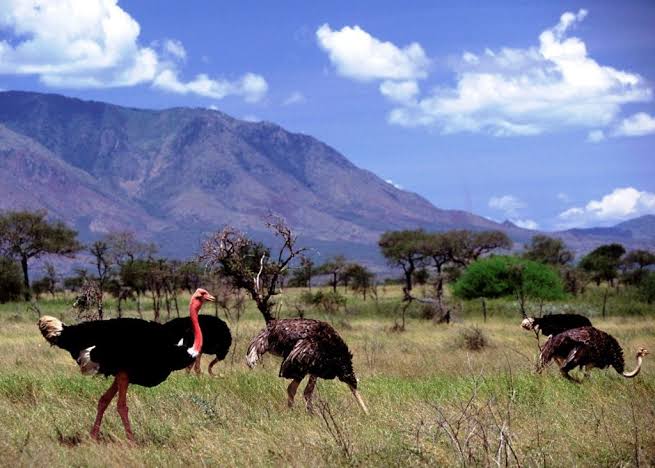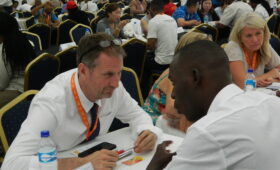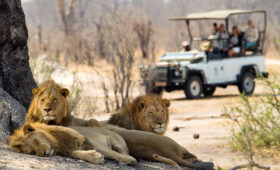The African Wildlife Foundation (AWF) and the Ministry of Environment, Climate, Tourism and Hospitality Industry (MECTHI) convened an inception meeting to discuss the development of a report on the status of the biodiversity economy in Zimbabwe. The meeting held on 28 September 2021 in Harare, Zimbabwe, was open to stakeholders from across the board, including media, government, private sector, development partners, and civil society organizations.
Participants discussed the most salient issues facing the biodiversity economy in Zimbabwe, with a deep dive into a biodiversity economy inception report prepared specially for the meeting, which will guide the process of how the actual study will be conducted, its key deliverables, and timelines.
“AWF was approached by the Ministry of Environment, Climate, Tourism and Hospitality Industry following a request from the Ministry of Finance and Economic Development to develop the report as a tool to inform policies around maximizing the country’s inclusive wealth and maintaining the long-term sustainability of its biological resource base. Obtaining optimal value from the biodiversity economy will also necessitate reducing society’s unsustainable dependence on natural resources,” said Olivia Mufute, the AWF Country Director for Zimbabwe.

The study will culminate in the publishing of the first-ever State of the Biodiversity Economy in Zimbabwe, including a framework for natural capital accounting and a blueprint for leveraging key investment opportunities in the biodiversity economy. It will be carried out by Zimbabwe Environmental Law Association (ZELA) in collaboration with Anchor Environmental Consultants. The consulting team will be supported by a technical committee composed of local experts in various fields of relevance to the biodiversity economy.
“We hope that this study might stimulate interest in the biodiversity economy among various stakeholders with an interest and/or influence over the status of the biodiversity economy. For example, the government is set to benefit from the report by gaining a clearer understanding of the contribution of biodiversity to the economy and its broader importance for livelihoods. This will, in turn, inform smart policy decisions on natural resources management,” said Mufute.
She added that the study will also help highlight ways in which biodiversity can be used to sustain and drive growth and development, particularly in impoverished rural areas which provide the main reservoirs for biodiversity in the country.
The study is being led by Dr. Jane Turpie, a renowned South African conservation biologist, and consultant of Anchor Environmental. Under the project, researchers will carry out an inventory of Zimbabwe’s biodiversity covering vascular plants, mammals, birds, domestic water fish, reptiles, and amphibians. The biodiversity inventory study will cover all ecosystems as well as involve critical sectors such as capital accounts, institutions, policy, and legislative sectors.
Zimbabwe has an impressive biodiversity collection that includes 5, 930 plant species, 670 birds, 270 mammal species, and 150 fish species found within and outside protected areas. Up to now, there is no detailed analysis of the country’s biodiversity and mechanism to foster the integration of biodiversity and ecosystem values into policy development and implementation.
Dr. Jane Turpie on Biodiversity in Africa
Dr. Turpie said to the inception of the study will lead to the publication of the first-ever state of the Biodiversity Economy in Zimbabwe which will include a framework for natural capital accounting and a blueprint for leveraging key investment opportunities in the biodiversity economy.
Speaking to the Herald Newspaper, she added, “This is a very complex study but several countries have undertaken this it requires a lot of data collection. So far, l am happy about the level of support that we have been promised from several key agencies in Zimbabwe.
African countries are increasingly turning to biodiversity as a contributor to their GDP as sustainability, climate change and biodiversity loss take center stage in the developmental agendas of many economies. A recent report by the World Economic Forum found that over half of the global GDP (USD44 trillion) relies on nature.

Bio-piracy is now rampant in most African countries resulting in huge losses of benefits that come with the utilization of plant and animal genetic resources. A study by the African Union estimated that the continent was losing close to $US10 billion from the theft of its biodiversity.
Successful biodiversity economies would not only provide much-needed revenues for households and governments, but they will also act as an incentive for increased participation in and funding for conservation. Healthy biodiversity has numerous economic benefits including food security, development of pharmaceutical products, tourism, climate regulation, soil nutrient recycling, diseases, and pest control.
About African Wildlife Foundation – biodiversity
The African Wildlife Foundation is the primary advocate for the protection of wildlife and wildlands as an essential part of a modern and prosperous Africa. Founded in 1961 to focus on Africa’s conservation needs, we articulate a uniquely African vision, bridge science, and public policy, and demonstrate the benefits of conservation to ensure the survival of the continent’s wildlife and wildlands.



